When you’re getting a massage in Dubai, you expect relaxation, relief, and respect. But not every part of your body should be touched - even by a licensed therapist. Knowing where not to touch during massage isn’t just about comfort; it’s about safety, culture, and professional boundaries. Whether you’re new to spa treatments or a regular at luxury resorts, understanding these limits helps you get the most out of your session - and avoid awkward or unsafe moments.
Understanding the Basics of Massage Boundaries
Origins and History
Massage has been practiced for thousands of years - from ancient Chinese and Ayurvedic traditions to Greek and Roman therapeutic rituals. But modern professional massage, especially in places like Dubai, blends global techniques with local cultural norms. In the UAE, where modesty and personal space are deeply respected, therapists are trained to avoid certain areas unless explicitly requested and medically justified. This isn’t just about rules - it’s about honoring the values of the people they serve.
Core Principles or Components
A safe massage follows three core principles: consent, context, and comfort. Consent means you agree to what’s being done - verbally or through body language. Context means the therapist knows your medical history and cultural background. Comfort means you feel safe enough to relax. These principles guide where touch is allowed. For example, the lower back is fine for tension relief, but the genitals, inner thighs, and breasts are off-limits unless you’re receiving a specialized medical treatment - and even then, only with a doctor’s referral and a chaperone present.
How It Differs from Related Practices
Massage in Dubai isn’t the same as sensual touch, erotic services, or even some spa treatments in other countries. In places where boundaries are looser, clients might assume more is acceptable. But in the UAE, strict codes govern what therapists can and cannot do. Here’s how it stacks up:
| Practice | Key Feature | Primary Benefit |
|---|---|---|
| Professional Thai Massage (Dubai) | Uses pressure points, stretching, no oil on sensitive areas | Improves flexibility and circulation |
| Swedish Massage (Global Standard) | Light to medium pressure, full-body, draping used | Reduces stress and muscle tension |
| Unregulated ‘Spa’ Services (Illegal) | Touches intimate areas, no medical training | None - high risk of harm |
Who Can Benefit from Understanding Massage Boundaries?
Everyone who gets a massage in Dubai benefits - tourists, expats, locals, men, women, and non-binary individuals. First-timers often don’t know what’s normal. Long-time clients might assume certain touches are okay because they’ve seen it elsewhere. Understanding boundaries protects you from unethical practitioners and helps you communicate your needs clearly. It also empowers you to recognize red flags - like a therapist who ignores draping, pushes past your comfort zone, or makes suggestive comments.
Benefits of Massage for Physical and Emotional Well-Being
Stress Reduction
Massage triggers the parasympathetic nervous system - the part of your body that says, “It’s safe to relax.” When done correctly, it lowers cortisol, slows your heart rate, and eases muscle tension. In Dubai’s fast-paced environment, where work stress and heat take a toll, a good massage can be a lifeline. But if you’re touched in a way that makes you uncomfortable, your body stays on high alert. That defeats the whole purpose.
Enhanced Functionality
Massage isn’t just about feeling good - it helps you move better. Therapists target tight shoulders from hunching over laptops, stiff hips from sitting in cars, or sore calves from walking in heels. These are all areas where touch is therapeutic. But touching the spine directly without proper training? That’s dangerous. The spine is protected by muscles, ligaments, and nerves. Even a slight misalignment from improper pressure can cause pain or nerve damage.
Emotional Well-Being
When you feel safe, you let go. A skilled therapist creates a space where you can release not just physical tension, but emotional stress too. But if boundaries are crossed - even unintentionally - trust breaks down. That’s why professional schools in Dubai train therapists to use clear communication, proper draping, and neutral language. Your emotional safety is just as important as your physical comfort.
Practical Applications
Knowing where not to touch during massage helps you choose the right spa. It helps you speak up if something feels off. And it protects you from scams or illegal services that prey on tourists. In Dubai, where wellness tourism is booming, this knowledge is a form of self-defense.
What to Expect When Engaging with a Professional Massage
Setting or Context
In Dubai, reputable spas are clean, quiet, and private. Rooms are temperature-controlled, with soft lighting and calming music. You’ll be given a robe and slippers. The therapist knocks before entering and leaves the room while you undress and cover yourself with a sheet. This isn’t just protocol - it’s respect. If you walk into a place where the lights are too bright, music is loud, or the therapist doesn’t leave the room, walk out.
Key Processes or Steps
A typical session starts with a brief consultation. The therapist asks about injuries, pain points, and preferences. Then you’re left alone to get comfortable. The therapist returns, begins with your back (always covered by a drape), and works systematically - neck, shoulders, arms, legs, feet. Sensitive areas like the abdomen or groin are never touched unless you’ve been cleared by a doctor and are receiving a specific treatment like lymphatic drainage, which requires a medical referral.
Customization Options
Massage in Dubai can be adjusted for your needs: deep tissue for athletes, gentle touch for seniors, prenatal for expecting mothers. But customization doesn’t mean crossing lines. You can ask for more pressure on your lower back, but you can’t ask for a therapist to touch your private areas - and they shouldn’t agree even if you do. Ethical therapists will redirect your request and offer alternatives.
Communication and Preparation
Speak up. If you feel uncomfortable, say so. If you’re unsure whether something is appropriate, ask. Good therapists welcome questions. Before your session, decide what areas you’re okay with being touched - and what’s off-limits. Write it down if you need to. It’s your body. Your rules.
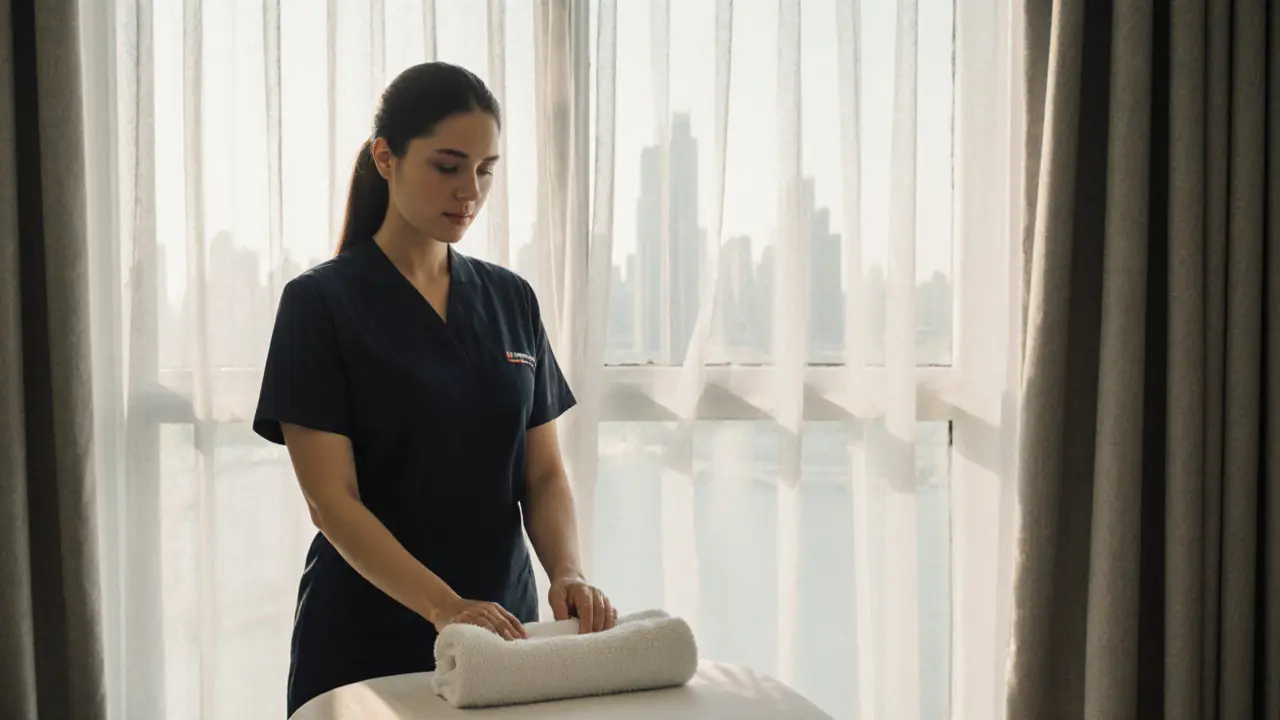
Safety and Ethical Considerations
Choosing Qualified Practitioners
Dubai requires all massage therapists to be licensed by the Dubai Health Authority (DHA). You can verify a therapist’s license online using their name or clinic ID. Look for certifications in anatomy, physiology, and medical massage - not just “relaxation training.” Avoid places that don’t list credentials or hide behind vague titles like “wellness consultant.”
Safety Practices
Here’s what every safe massage session includes:
| Practice | Purpose | Example |
|---|---|---|
| Proper draping | Protects privacy and prevents accidental contact | Only the area being worked on is exposed |
| Sanitized hands and tools | Prevents infection | Therapist washes hands before and after |
| Consent check-ins | Ensures ongoing comfort | “Is this pressure okay?” |
Setting Boundaries
Your boundaries are non-negotiable. You have the right to say “no” at any time - even if you’ve already paid. If a therapist ignores your discomfort, changes the subject, or pressures you, it’s not just rude - it’s illegal. Report it to the spa manager or the DHA. Your voice matters.
Contraindications or Risks
There are medical reasons to avoid massage entirely - or certain areas. Don’t get a massage if you have:
- Open wounds, burns, or recent surgery near the area
- Deep vein thrombosis (blood clots)
- Severe osteoporosis
- Active infections or fever
- Recent spinal injury or herniated disc
Even if you’re healthy, avoid pressure on the abdomen during pregnancy, the neck if you have carotid artery disease, or the lower back if you have kidney issues. Always disclose your full medical history.
Enhancing Your Experience with Massage
Adding Complementary Practices
Pair your massage with mindfulness. Breathe deeply during the session. Afterward, sip warm water and sit quietly for 10 minutes. This helps your body integrate the release. Some people find aromatherapy with lavender or eucalyptus enhances relaxation - just make sure the oils are pure and the therapist knows your sensitivities.
Collaborative or Solo Engagement
Massage is a solo experience - even if you’re with a partner. Don’t feel pressured to book a couples’ massage if you’re not comfortable sharing space. Many people prefer privacy. And if you’re traveling with someone, respect their boundaries too. What’s relaxing for one person might feel invasive to another.
Using Tools or Props
Some spas offer heated stones, warm towels, or gentle rollers. These are safe when used correctly. But avoid DIY tools like massage guns on your spine or neck - they’re not designed for those areas. Let the therapist use the tools. They’ve been trained.
Regular Engagement for Benefits
One massage won’t fix chronic pain or stress. But monthly sessions - paired with good sleep, hydration, and movement - can transform how you feel. Think of it like brushing your teeth: small, consistent care leads to long-term health.
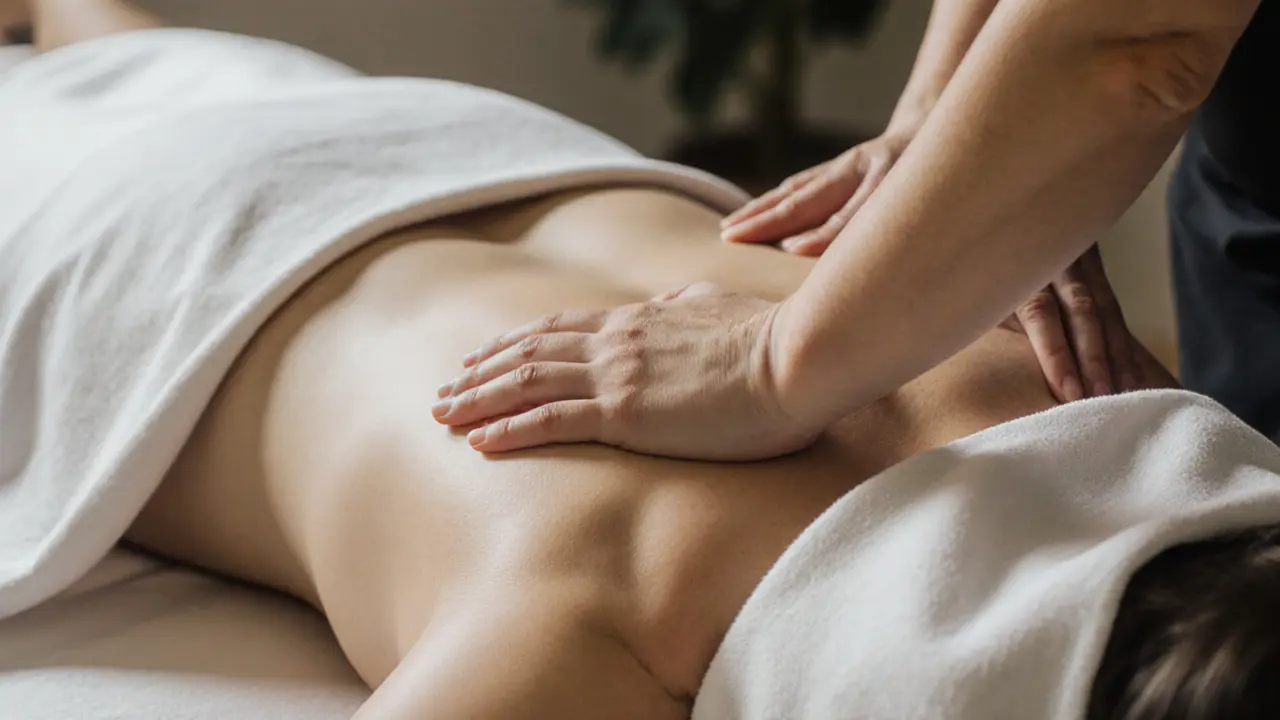
Finding Resources or Experts for Massage in Dubai
Researching Qualified Practitioners
Check the Dubai Health Authority website for licensed clinics. Read reviews on Google and TripAdvisor - but look for patterns. If multiple people mention “inappropriate touch,” avoid that place. Stick to hotels with spa departments or clinics affiliated with hospitals. These have stricter oversight.
Online Guides and Communities
Follow Dubai-based wellness influencers who focus on evidence-based practices, not just luxury. Join Facebook groups like “Dubai Wellness Network” or “Expats in Dubai Health & Safety.” These communities share real experiences and warn about shady operators.
Legal or Cultural Considerations
In the UAE, any sexualized touch during massage is illegal - and can lead to deportation or jail. Even if a service is offered “privately,” it’s not worth the risk. Dubai enforces these laws strictly. Respect the culture, and you’ll be respected in return.
Resources for Continued Learning
Read “The Complete Guide to Massage Therapy” by Michael Salter. Watch short videos from the International Massage Association. Take a free online course on massage ethics from Coursera. Knowledge protects you.
FAQ: Common Questions About Massage Boundaries
Where not to touch during massage in Dubai?
In Dubai, professional massage therapists never touch the genitals, breasts, inner thighs, or lower back of pregnant clients without medical clearance. The spine, neck, and face are handled with extreme care and only by trained professionals. Any touch outside the shoulders, arms, legs, feet, and upper back (with proper draping) is considered inappropriate. If a therapist suggests otherwise, leave and report them.
What happens during a professional massage in Dubai?
You’ll start with a quick chat about your goals and any injuries. Then you’ll be left alone to undress and cover yourself with a sheet. The therapist returns, begins with your back, and works systematically - always keeping non-working areas covered. They’ll check in with you about pressure. The session ends with you being alone again to dress. No touching of private areas. No suggestive comments. Just calm, professional care.
Is it okay to ask for a massage on sensitive areas?
No. Even if you ask, a licensed therapist in Dubai will refuse. Their training and legal responsibility require them to say no. This isn’t about being strict - it’s about protecting you. If you need treatment for a medical issue in a sensitive area, see a physiotherapist or doctor. They’ll refer you to a specialist if needed.
Can I get a massage if I’m pregnant?
Yes - but only with a prenatal-certified therapist. They’ll avoid pressure on the abdomen, lower back, and ankles. They’ll use side-lying positions and avoid certain oils. Always tell them you’re pregnant, even if it’s early. A good therapist will ask you questions to make sure it’s safe for you and your baby.
How do I know if a massage therapist is legitimate?
Check their DHA license number on the official website. Look for certifications in anatomy and medical massage. Avoid places that don’t list credentials, use vague titles, or have poor reviews mentioning discomfort or inappropriate behavior. Reputable spas are transparent - they’ll show you their licenses and answer your questions without hesitation.
Conclusion: Why Knowing Where Not to Touch Matters
A Path to True Relaxation
Massage in Dubai is a gift - when done right. It’s not about being touched everywhere. It’s about being treated with dignity. When you know where not to touch during massage, you’re not just protecting yourself - you’re supporting a culture of professionalism and safety.
Try It Mindfully
Choose a licensed therapist. Speak up if something feels off. Walk away if you’re pressured. Your comfort isn’t optional - it’s essential.
Share Your Journey
Tried a massage in Dubai? Share your experience in the comments - good or bad. Your story could help someone else avoid a bad situation. Follow this blog for more honest tips on wellness in the UAE.
Some links may be affiliate links, but all recommendations are based on research and quality.
Word count: 1,682
Suggested Images
- A serene spa room in Dubai with soft lighting, a massage table, and a draped client
- A licensed therapist in uniform, washing hands before a session
- A close-up of a massage drape being properly positioned over the hips
- A woman smiling after a massage, holding a glass of water, relaxed and calm
- A Dubai Health Authority license displayed on a clinic wall
Suggested Tables
- Comparison of Massage Types in Dubai vs. Other Regions
- Essential Safety Practices During Massage
- Key Benefits of Professional Massage in Dubai
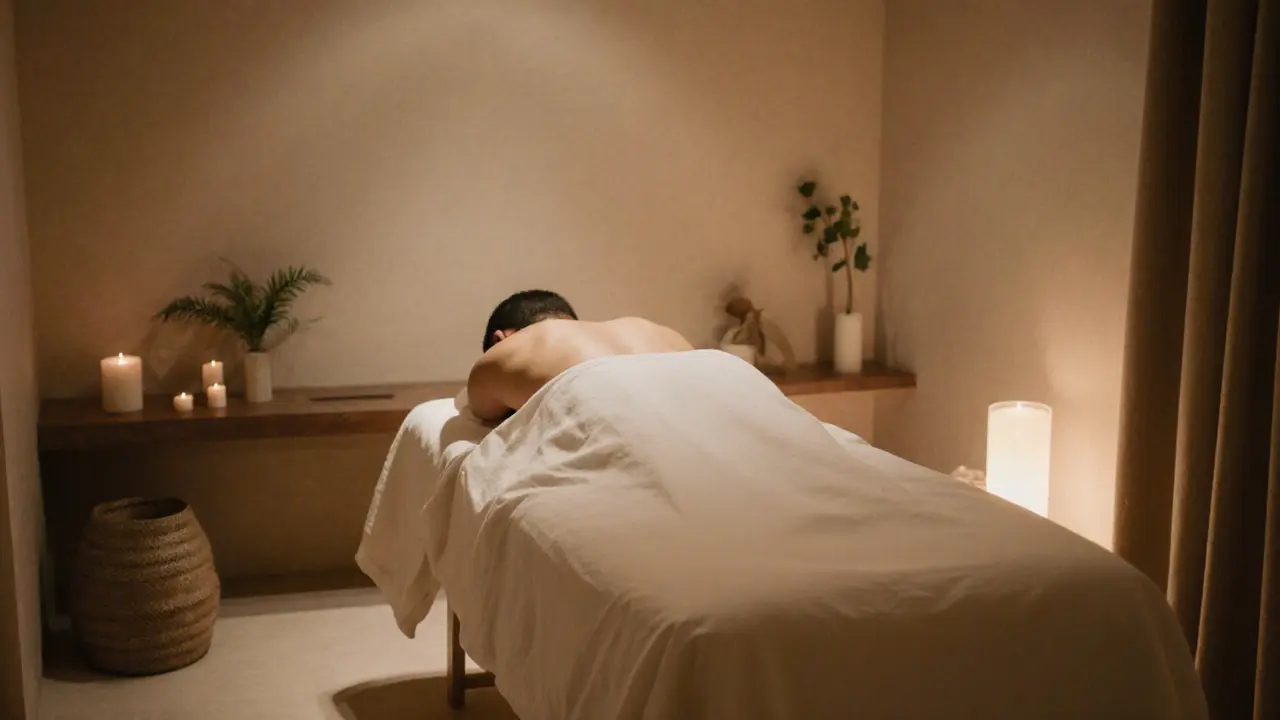
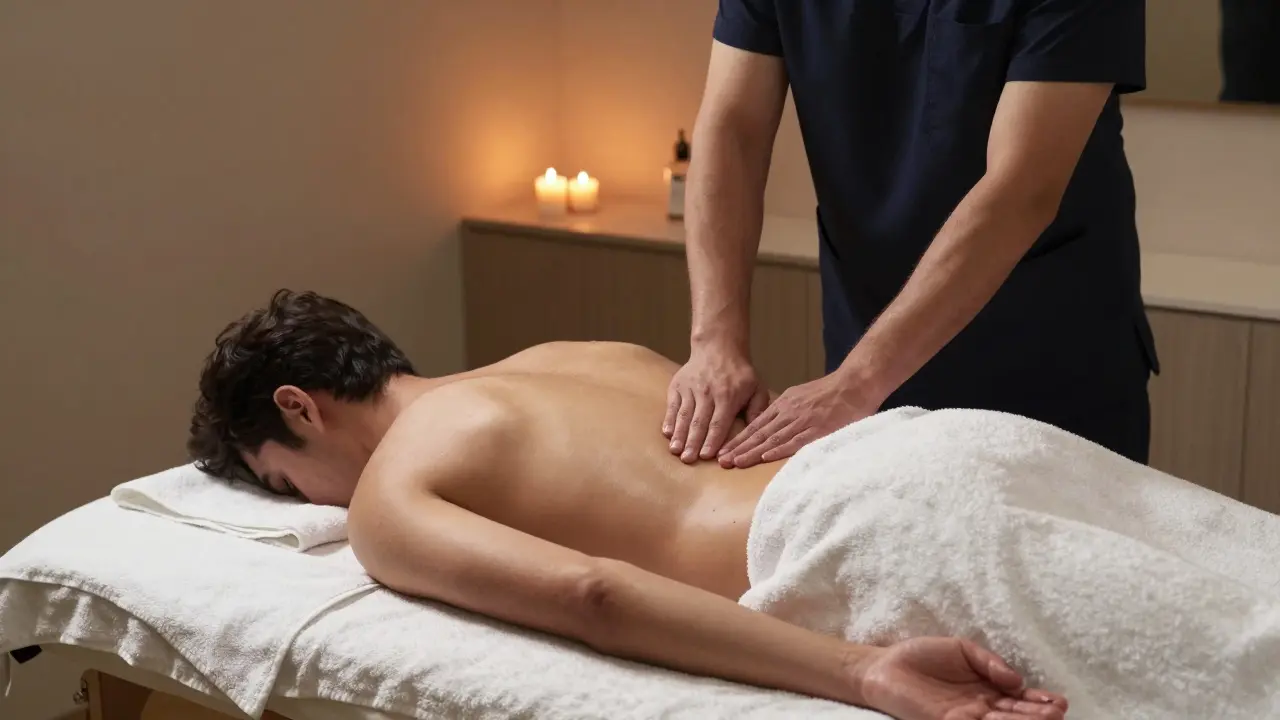
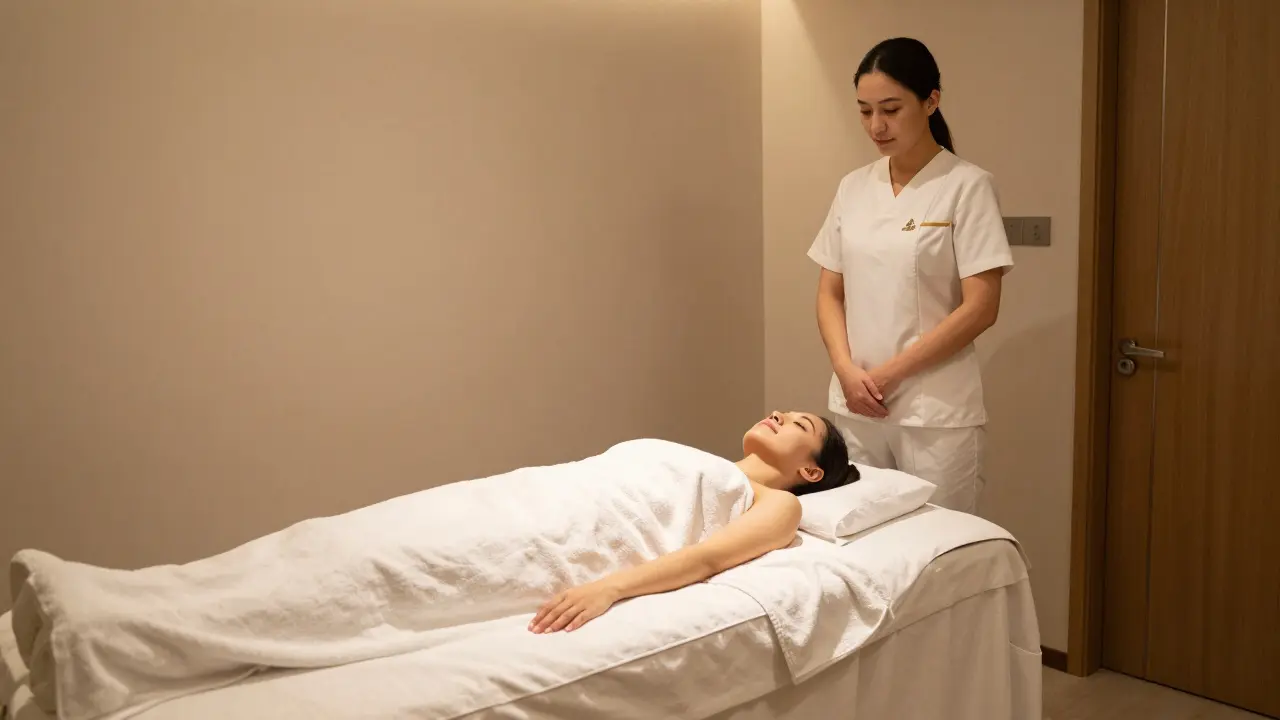

Mrigank Srivastava
November 17, 2025 AT 04:34Been getting massages in Dubai for years. Never once had an issue, but I always make sure the therapist knows I don’t want any lower back or abdominal work. Simple. Clear. No drama. Just respect.
alyssa golightly
November 18, 2025 AT 05:47I’m American and I thought I knew massage culture until I came to Dubai. The draping? The silence? The lack of small talk? It was weird at first. Then I realized - this isn’t about suppression, it’s about dignity. I’ve never felt safer or more relaxed. Seriously, this post should be mandatory reading for every tourist.
Kristina Mozdzierz
November 18, 2025 AT 12:56Thank you for this comprehensive and culturally sensitive overview. The emphasis on consent, draping, and professional licensing aligns precisely with ethical standards in therapeutic practice. I would further recommend that all visitors consult the Dubai Health Authority’s official guidelines prior to booking any service, as these documents provide legally binding parameters for practitioner conduct.
Hannah Ronquillo
November 20, 2025 AT 01:01One of the best things about Dubai’s massage scene is how clear the rules are. No guessing. No ambiguity. If you’re unsure, just ask - and if they hesitate, walk out. I used to worry about offending therapists, but now I know: good ones welcome questions. My last session? 90 minutes of pure calm. No pressure, no weirdness. Just healing.
Tim Paradis
November 21, 2025 AT 18:30Stop overcomplicating this. Don’t touch private parts. That’s it. If you need a manual for that you’re already in the wrong place. Also if you’re paying for a massage and you’re still nervous about boundaries you probably shouldn’t be getting one at all
Matt Ferry
November 23, 2025 AT 02:35Let’s be real - this post reads like a PR brochure. In every city, there are shady operators. Dubai’s no different. The fact that you’re listing ‘no touching’ as if it’s unique here is naive. I’ve had therapists in LA and Berlin cross lines too. The real issue isn’t location - it’s enforcement. And let’s be honest - how many of these ‘licensed’ therapists are actually vetted? I’ve seen the paperwork. It’s not as tight as they claim.
Richard Reyes
November 23, 2025 AT 19:39Thank you for the thoughtful and meticulously detailed framework. The distinction between therapeutic intent and cultural context is not only accurate but vital. I would respectfully suggest that this document be archived by the Dubai Health Authority as a reference guide for both practitioners and clients. The emphasis on medical contraindications, proper draping, and the non-negotiable nature of consent reflects the highest standards of professional ethics. This is not merely advice - it is a model for responsible wellness practice.